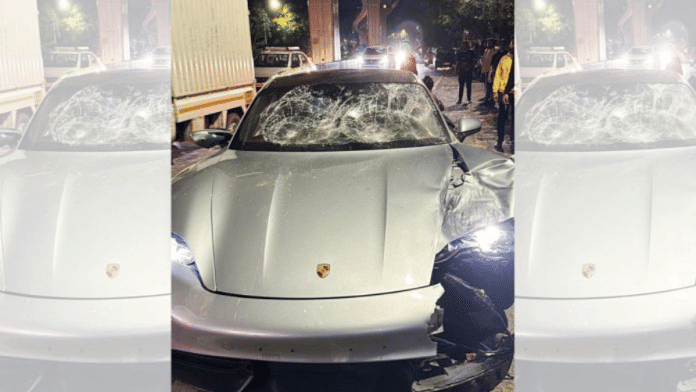New Delhi: Under what circumstances can a minor be treated as an “adult”? That question has come into focus after the arrest of a 17-year-old teenager in the Pune Porsche accident in which two people were killed.
While the Maharashtra Police have now booked the teenager for rash and negligent driving, the lenient bail conditions, including a 300-word essay, imposed on him soon after his arrest drew national outrage. There have been suggestions that he should be tried as an adult instead of as a child under the Juvenile Justice (JJ) Act — the law that lays down a different procedure for offences involving minors.
Significantly, the JJ Act doesn’t permit the 17-year-old to be tried as an “adult” as he has not committed a “heinous offence” under the law. He further has the right to bail regardless of whether the offence is “bailable”.
Here’s a breakdown of what the law is and under what circumstances a minor can be treated as an adult.
Also Read: What are sections 75 & 77 of Juvenile Justice Act, invoked for father of teen in Pune Porsche case
When is a minor treated as an adult
Since the 17-year-old is considered a “child” under the JJ Act, he is currently being tried by the Juvenile Justice Board (JJB) and not a regular criminal court. The JJB is a special judicial body under the act comprising a principal magistrate and two social workers, who are then responsible for adjudicating the case against the child.
In the case of “heinous offences” — as in the 2012 Nirbhaya case — one may be tried as an adult in a specialised children’s court instead of being tried as a child.
Under the JJ Act, any child who commits an offence is known as a “child in conflict with law”. Someone who is less than 18 years old on the date of the offence is considered a child.
However, in case of heinous offences, a child older than 16 years may be tried as an “adult” based on the assessment of the JJB. Heinous offences are those which carry an imprisonment of more than seven years under the Indian Penal Code.
“In case of a heinous offence alleged to have been committed by a child, who has completed or is above the age of sixteen years, the Board shall conduct a preliminary assessment…the Board may order a transfer of the trial of the case to the Children’s Court having jurisdiction to try such offences,” reads the relevant provision of the act.
Even in cases where the offence is “heinous”, one cannot automatically be tried as an adult. The JJB retains the right of assessment of whether a child older than 16 should be tried as an adult.
The JJB must conduct a preliminary assessment of the circumstances in which the offence was committed, the physical and mental capacity of the child, and their ability to understand consequences to determine whether they must be tried as an adult. To conduct such an assessment, the JJB may even take the help of child psychologists or other experts.
For instance, in the 2017 Ryan International School murder case, the JJB had decided that the minor accused should be tried as an adult based on his psychological evaluation. In this case, the Supreme Court had said that one must look at the physical maturity of the child and their social/emotional competence to decide whether one should be tried as an adult.
Just because one has the ‘mental capacity’ to commit an offence doesn’t mean they should be tried as an adult, the court had said in 2022.
Similarly, a Delhi court last year set aside a JJB order and ordered that two 17-year-olds be treated as adults in a murder case. The court noted the brutality of the crime and held that they were “emboldened” to commit the “brutal” offence.
Cases where the JJB decides that the child is to be tried as an adult are transferred to a designated ‘Children’s Court’.
What happens in this case
In the Pune case, the 17-year-old has been booked for causing death by negligence under Section 304A of the Indian Penal Code. The law prescribes imprisonment of up to two years.
Since the imprisonment prescribed under the provision is less than seven years, it’s not a “heinous” offence under the IPC. This means that in the Pune case, the JJ Act does not allow the JJB to refer this case to the children’s court for his trial as an adult.
However, at the same time, Pune Police have also filed a case under Section 304 of the IPC, which provides for culpable homicide not amounting to murder. For this offence, the law prescribes a prison sentence of up to 10 years in jail as well as a fine.
Since the sentence is over seven years, this could count as a heinous offence, which is why Pune Police have filed an application before the JJB to try the child as an adult.
There have been concerns about whether these sections can be applied together. Critics also say that the offence of culpable homicide was added later so that the teenager could be tried as an adult.
Regardless of the gravity of the offence, however, bail is a matter of right for a minor and can only be denied where such release is likely to bring the accused in association with known criminals and expose them to danger.
This means that a court cannot deny bail to the accused solely on the ground that he’s being charged with a grievous offence.
Akshat Jain is a student of the National Law University, Delhi, and an intern with ThePrint.
Also Read: Bid to ‘blame’ driver, tycoon’s arrest & ‘cover-up’ — what we know about Pune Porsche case so far






